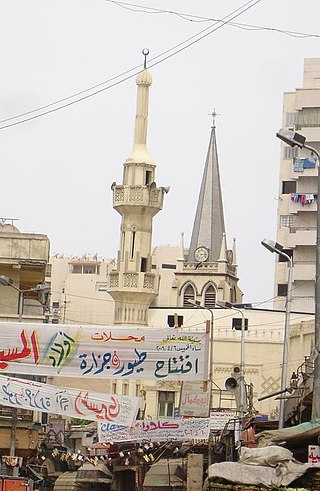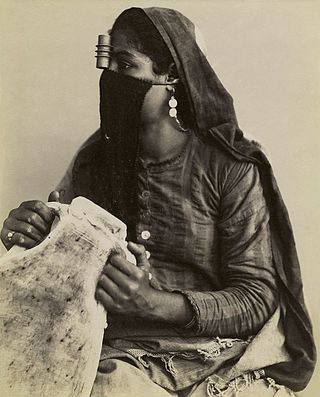Related Research Articles

An identity document is a document proving a person's identity.
Religious discrimination is treating a person or group differently because of the particular religion they align with or were born into. This includes instances when adherents of different religions, denominations or non-religions are treated unequally due to their particular beliefs, either by the law or in institutional settings, such as employment or housing.

An electronic identification ("eID") is a digital solution for proof of identity of citizens or organizations. They can be used to view to access benefits or services provided by government authorities, banks or other companies, for mobile payments, etc. Apart from online authentication and login, many electronic identity services also give users the option to sign electronic documents with a digital signature.

Identity document forgery is the process by which identity documents issued by governing bodies are illegally copied and/or modified by persons not authorized to create such documents or engage in such modifications, for the purpose of deceiving those who would view the documents about the identity or status of the bearer. The term also encompasses the activity of acquiring identity documents from legitimate bodies by falsifying the required supporting documentation in order to create the desired identity.

Religion in Egypt controls many aspects of social life and is endorsed by law. The state religion of Egypt is Islam, although estimates vary greatly in the absence of official statistics. Since the 2006 census, religion has been excluded, and thus available statistics are estimates made by religious and non-governmental agencies. The country is majority Sunni Muslim, with the next largest religious group being Coptic Orthodox Christians. The exact numbers are subject to controversy, with Christians alleging that they have been systemically under-counted in existing censuses.

The National Database & Registration Authority (NADRA) is an independent and autonomous agency under the control of the Interior Secretary of Pakistan that regulates Government Databases and statistically manages the sensitive registration database of all the National Citizens of Pakistan. Lieutenant General Muhammad Munir Afsar serves as Chairman of National Database and Registration Authority (NADRA) Pakistan.

Carteira de identidade Nacional(In portuguese), is the official national identity document in Brazil. It is often informally called carteira de identidade, "RG" or simply identidade in Portuguese. The card contains the name of the bearer, filiation, place of birth, date of birth, signature and thumbprint of the bearer. Other national documents can legally be used as an identity card, such as a federative unit-issued driver's license, passport or, for minors, a birth certificate. Each card has a unique RG number. As of 11 January 2023, the CPF number will be used as the RG number on new identity cards.

In Turkey, secularism or laicism was first introduced with the 1928 amendment of the Constitution of 1924, which removed the provision declaring that the "Religion of the State is Islam", and with the later reforms of Turkey's first president Mustafa Kemal Atatürk, which set the administrative and political requirements to create a modern, democratic, secular state, aligned with Kemalism.
The Egyptian identification card controversy is a series of events, beginning in the 1990s, that created a de facto state of disenfranchisement for Egyptian Baháʼís, atheists, agnostics, and other Egyptians who did not identify themselves as Muslim, Christian, or Jewish on government identity documents.
According to Article 9 of the Lebanese Constitution, all religions and creeds are to be protected and the exercise of freedom of religion is to be guaranteed providing that the public order is not disturbed. The Constitution declares equality of rights and duties for all citizens without discrimination or preference. Nevertheless, power is distributed among different religious and sectarian groups. The position of president is reserved for a Maronite Christian; the role of Presidency of Parliament for a Shiite Muslim; and the role of Prime Minister for a Sunni Muslim. The government has generally respected these rights; however, the National Pact agreement in 1943 restricted the constitutional provision for apportioning political offices according to religious affiliation. There have been periodic reports of tension between religious groups, attributable to competition for political power, and citizens continue to struggle with the legacy of the civil war that was fought along sectarian lines. Despite sectarian tensions caused by the competition for political power, the Lebanese continue to coexist.

The Polish Identity Card is a national identity document issued to Polish citizens. As Poland is a European Union member state it is also serves a European Identity card. Every Polish citizen 18 years of age or older residing permanently in Poland is required to have an identity card issued by the local office of civic affairs. Children as well as Polish citizens living permanently abroad are entitled, but not required, to have one. Identity cards are valid for a period of 10 years.

In a predominantly Muslim society, as many as 90% of women in Egypt have adopted a form of veiling. A majority of Egyptian women cover at least their hair with the hijab. A hijab refers to a head covering that is worn by Muslim women. Although the phenomenon of wearing the niqāb, a veil which covers the face is not as common, the niqab in Egypt has become more prevalent. While a few women in Egypt wear a black niqab along with a billowing black abaya as seen in countries such as Saudi Arabia, many choose to wear different colors of the niqab or manipulate the hijab to cover their face. Regardless, the growing trend of munaqqabat, or women who wear the niqab, has alarmed the authorities. They have begun to see this dress as a security threat, because it hides the face, and because it is perceived as a political statement, a rejection of the state in favor of a strict Islamic system.

The Greek identity card is the official national identification document for Greek citizens. It is issued by the Hellenic Police.

The Norwegian identity card, commonly referred to as the national identity card in Norway, is a non-compulsory biometric identity document issued since 30 November 2020. It is one of two official identity documents issued by the Norwegian Police Service, the other being the Norwegian passport. It is only issued to Norwegian citizens, and may indicate citizenship so that it can be used as a travel document facilitating freedom of movement within the European Free Trade Association and the European Economic Area. For travel within the Nordic countries no identity documentation is legally required for Nordic citizens due to the Nordic Passport Union.

Multiple countries legally recognize non-binary or third gender classifications. These classifications are typically based on a person's gender identity. In some countries, such classifications may only be available to intersex people, born with sex characteristics that "do not fit the typical definitions for male or female bodies."
The Afghan Tazkira is an official national identity document issued to every national and citizen of Afghanistan, including a member of the Afghan diaspora around the world.

The Philippine Identification System ID, also known as the Philippine Identification Card or simply the national ID, is the official national identity card for Filipino citizens worldwide and foreign permanent residents in the Philippines. The document is a significant part of the Philippine Identification System (PhilSys), the national identification system to be implemented by the Philippine government.
Freedom of religion in Australia is allowed in practice and protected to varying degrees through the constitution and legislation at the Federal, state and territory level. Australia is a pluralist country with legislated principle of state neutrality and with no state religion. The nation has over 13.6 million people who identify as religious and over 9.8 million who identify with no religion.
The status of religious freedom in Africa varies from country to country. States can differ based on whether or not they guarantee equal treatment under law for followers of different religions, whether they establish a state religion, the extent to which religious organizations operating within the country are policed, and the extent to which religious law is used as a basis for the country's legal code.
Hate speech is public speech that expresses hate or encourages violence towards a person or group based on something such as race, religion, sex, or sexual orientation. Hate speech is "usually thought to include communications of animosity or disparagement of an individual or a group on account of a group characteristic such as race, colour, national origin, sex, disability, religion, or sexual orientation".
References
- ↑ "Will removal of religious identity from ID cards stop discrimination in Egypt?". Al Arabiya English. 2018-12-23. Retrieved 2023-06-23.
- ↑ "Bill to omit mention of religion on national ID card: MP". Egypt Independent. 2018-11-11. Retrieved 2023-06-23.
- ↑ Agencies, The New Arab Staff & (2023-05-24). "Sudanese still await aid on day two of tense ceasefire". www.newarab.com/. Retrieved 2023-06-23.
- ↑ "Egyptian MP to Submit Bill Omitting Religion from National IDs to Parliament | Egyptian Streets". 2018-11-12. Retrieved 2023-06-23.
- ↑ "Egypt: Fighting discrimination will need 'a lot more than taking religion off ID cards'". World Watch Monitor. 2018-11-29. Retrieved 2023-06-23.